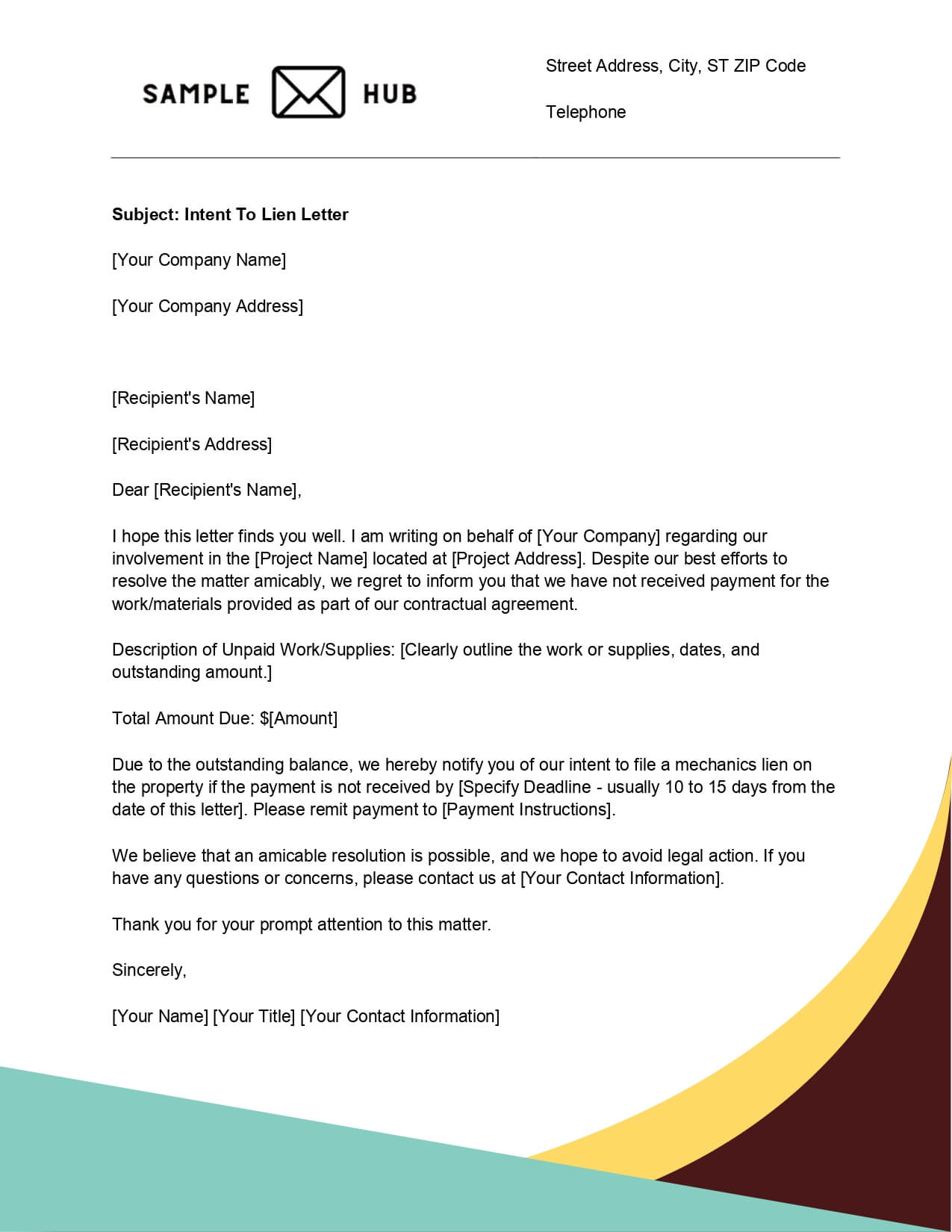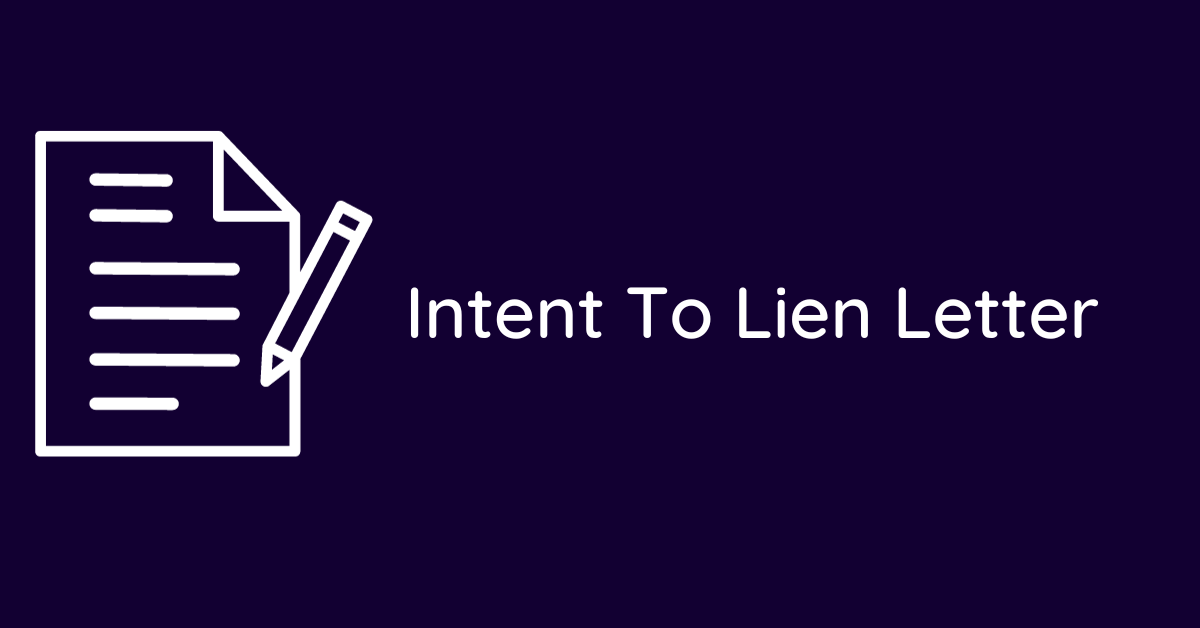Are you a contractor or supplier who has not been paid for your services or materials? If so, you may need to send an Intent to Lien Letter to the property owner or general contractor.
This letter serves as a warning that you intend to file a lien against the property if payment is not received. The purpose of this letter is to encourage payment and avoid the need for legal action.
In this blog article, we will provide you with templates, examples, and samples of Intent to Lien Letters. These resources will make it easy for you to write a letter that is specific to your situation.
Whether you are a contractor, subcontractor, or supplier, we have a letter that will work for you. By using our templates, you can save time and ensure that your letter is professional and effective.
Our goal is to help you get paid for your work or materials without having to go through the hassle and expense of legal action.
By sending an Intent to Lien Letter, you can protect your rights and encourage payment. So, let’s get started and find the right letter for your situation.
Intent To Lien Letter
Dear [Client’s Name],
I hope this letter finds you well. We appreciate the opportunity to work with you on [Project/Service]. However, despite our best efforts to resolve the matter, there are outstanding payments on your account.
As of [Current Date], the total amount due is $[Amount]. We understand that unforeseen circumstances may arise, and we are willing to work with you to find a solution. However, it is crucial to address the outstanding balance promptly.
We value the relationship we’ve built with you and believe in an amicable resolution. This letter serves as formal notice of our intent to file a lien on the property related to the aforementioned project if the outstanding balance is not settled within [Number of Days] days from the date of this letter.
Please review the attached invoice for a detailed breakdown of the amount owed. We encourage you to contact our billing department at [Your Contact Number] to discuss a suitable arrangement or address any concerns you may have.
We genuinely hope to avoid the necessity of a lien and find a resolution that benefits both parties. Your prompt attention to this matter is appreciated.
Thank you for your understanding and cooperation in resolving this matter.
Sincerely,
[Your Full Name]
Notice Of Intent To Lien Letter
Dear [Client’s Name],
We trust this letter finds you well. We appreciate your collaboration on [Project/Service]. However, it has come to our attention that there are outstanding payments on your account.
As of [Current Date], the total amount due is $[Amount]. We understand that circumstances may arise, and we are open to discussing any challenges you may be facing in settling the outstanding balance.
This letter serves as formal notice of our intent to file a lien on the property related to the aforementioned project if the outstanding balance is not settled within [Number of Days] days from the date of this letter.
We value our relationship and would prefer an amicable resolution. Please review the attached invoice for a detailed breakdown of the amount owed. Contact our billing department at [Your Contact Number] to discuss payment options or to address any concerns.
We hope to resolve this matter without the need for a lien and appreciate your prompt attention to this issue.
Thank you for your understanding and cooperation.
Sincerely,
[Your Full Name]
Notice Of Lien Letter
Dear [Client’s Name],
We trust this letter finds you well. This communication is to inform you that, unfortunately, due to the outstanding balance on your account, we are left with no alternative but to place a lien on the property associated with [Project/Service].
As of [Current Date], the total amount due is $[Amount]. We understand that unforeseen circumstances can arise, and we are willing to work with you to find a resolution. It is imperative, however, that we address this matter promptly to avoid any legal actions.
A copy of the detailed invoice is attached for your reference. We urge you to contact our billing department at [Your Contact Number] at your earliest convenience to discuss payment options or to address any concerns you may have regarding the outstanding balance.
We regret having to take this step but trust that we can resolve this matter amicably. Your prompt attention to this issue is appreciated.
Thank you for your cooperation.
Sincerely,
[Your Full Name]
Intent To Lien Letter Florida
Dear [Client’s Name],
We hope this letter finds you well. We are writing to inform you of our intent to file a lien on the property associated with [Project/Service] in accordance with the laws of the State of Florida.
As of [Current Date], an outstanding balance of $[Amount] remains unpaid for the services provided. We have made repeated attempts to reach a resolution, but unfortunately, the matter remains unresolved.
According to Florida law, we are obligated to notify you of our intent to place a lien on the property. This is not our preferred course of action, and we sincerely hope that we can work together to find a resolution without resorting to legal measures.
Please consider this letter as a final warning before we initiate the lien process. We encourage you to contact our billing department at [Your Contact Number] to discuss a payment plan or address any concerns you may have regarding the outstanding balance.
We value our relationship with you and trust that we can resolve this matter amicably. Your prompt attention to this issue is appreciated.
Thank you for your cooperation.
Sincerely,
[Your Full Name]
Intent To Lien Letter Texas
Dear [Client’s Name],
We trust this letter reaches you well. We are writing to notify you of our intention to file a lien on the property associated with [Project/Service] in compliance with the laws of the State of Texas.
As of [Current Date], there remains an outstanding balance of $[Amount] for the services rendered. Despite our efforts to communicate and address the matter, the issue persists.
In accordance with Texas statutes, we are required to inform you of our intent to place a lien on the property. This is not a step we take lightly, and we genuinely hope to find a resolution without the need for legal actions.
This letter serves as a final warning before initiating the lien process. We urge you to reach out to our billing department at [Your Contact Number] to discuss a potential payment plan or to address any concerns you may have regarding the outstanding amount.
We value our relationship with you and believe that, by working together, we can resolve this matter amicably. Your prompt attention to this issue is crucial.
Thank you for your cooperation.
Sincerely,
[Your Full Name]

How to Write an Effective Intent to Lien Letter
If you’re a contractor or supplier who hasn’t been paid for your services, you may need to send an intent to lien letter to protect your rights.This letter is a legal document that notifies the property owner and other parties involved that you intend to file a lien against the property if payment isn’t received. Here’s how to write an effective intent to lien letter.
1. Understand the Purpose of the Letter
Before you start writing, it’s important to understand the purpose of the intent to lien letter. This letter is not a demand for payment, but rather a warning that you intend to file a lien if payment isn’t received. It’s a legal document that can help protect your rights and ensure that you get paid for your work.
2. Include the Necessary Information
Your intent to lien letter should include the necessary information, such as the property owner’s name and address, a description of the work you performed, the amount owed, and the date payment was due. You should also include a statement that you intend to file a lien if payment isn’t received.
3. Use Professional Language
When writing your intent to lien letter, it’s important to use professional language. Avoid using slang or informal language, and make sure your letter is clear and concise. You want to make sure that the recipient understands the seriousness of the situation.
4. Be Specific
Be specific about the work you performed and the amount owed. Include any relevant invoices or contracts to support your claim. The more specific you are, the more likely you are to be taken seriously.
5. Provide a Deadline
Provide a deadline for payment in your intent to lien letter. This will give the recipient a specific timeframe to respond and make payment. Be reasonable with your deadline, but also make sure it’s clear that you expect payment by that date.
6. Follow Up
If you don’t receive payment by the deadline you provided, it’s important to follow up with the recipient. You may need to send a demand letter or file a lien if payment still isn’t received. Make sure you keep copies of all correspondence and documentation.
7. Seek Legal Advice
If you’re unsure about how to write an intent to lien letter or what your legal rights are, it’s important to seek legal advice. A lawyer can help you understand your options and ensure that you’re taking the necessary steps to protect your rights.
What is a Notice of Intent to Lien?
A Notice of Intent to Lien is a formal document sent by a contractor or supplier to notify a property owner that they have not been paid for their work or materials on a construction project.
Should you send a Notice of Intent to Lien?
I believe that sending a Notice of Intent to Lien can be a powerful tool to prompt payment from a delinquent party. It shows that you are serious about collecting what you are owed and can help protect your right to file a lien if necessary. In my opinion, it is a proactive step that can help resolve payment disputes before they escalate.
FAQs About Intent to Lien Letter
1. What is an Intent to Lien Letter?
An Intent to Lien Letter is a written notice sent by a contractor or supplier to a property owner, informing them that they have not been paid for their services and that they intend to file a lien against the property if payment is not received.
2. When should I send an Intent to Lien Letter?
You should send an Intent to Lien Letter as soon as possible after you have not been paid for your services. In most states, there is a deadline for filing a lien, so it is important to act quickly.
3. What should be included in an Intent to Lien Letter?
An Intent to Lien Letter should include the amount owed, a description of the services provided, the date the services were provided, and a warning that a lien will be filed if payment is not received.
4. Do I need to send an Intent to Lien Letter before filing a lien?
In some states, sending an Intent to Lien Letter is a requirement before filing a lien. Even if it is not required, it is a good idea to send one as it may prompt the property owner to pay the outstanding balance.
Related:

